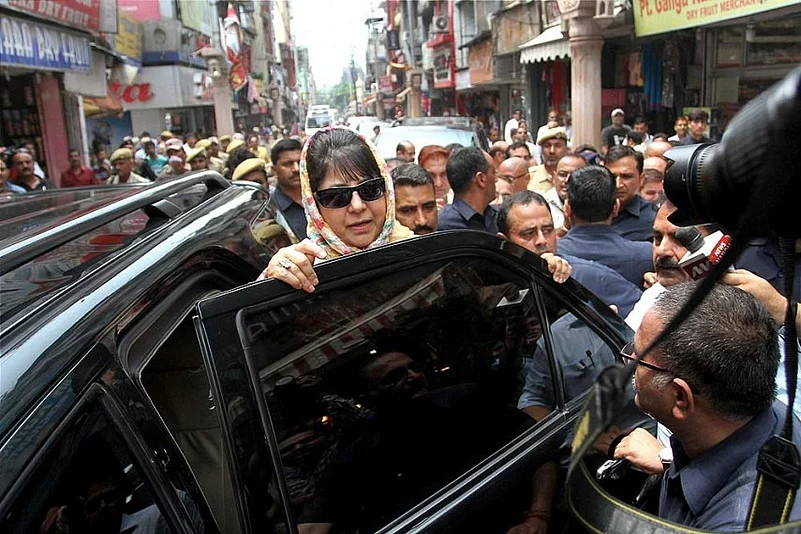Jammu and Kashmir Chief Minister Mehbooba Mufti on Friday met Prime Minister Narendra Modi amidst raging debate on 'special status' to the state under the Article 370. According to ANI reports Mufti said that the Prime Minister has given a positive response on the same and has assured that there will be no fiddling with Article 370.
The meeting comes in the backdrop of the debate on Article 35A of the Constitution that grants special status to the state and is being challenged in the Supreme Court.
Status Quo Of Article 370 Must Be Maintained, Says Mehbooba Mufti After Meeting PM Modi
She further added that there will be no fiddling with state's special status as assured by PM Modi

"The basis of our agenda of alliance is that status quo of 370 has to be maintained and none of us can go against that. Prime Minister Narendra Modi gave 100 percent assurance on the agenda of alliance. He has said that there will be no fiddling with it," Mufti said after meeting the Prime Minister here.
Mufti further highlighted that the discussion on Article 35 (A) across the nation is making a major impact on the situation of the Valley.
"The condition was tensed last year in the valley and now the situation is slowly normalizing. The people of the state think that their identity can be in danger. A message should be conveyed that nothing is going to happen. Jammu and Kashmir cannot is a crown of India should be reiterated," she said.
Article 370 of the Indian constitution grants special autonomous status to the state of Jammu and Kashmir.
Article 35A of the Constitution empowers the Jammu and Kashmir Assembly to define the state's permanent residents and their privileges.
This has been challenged in the Supreme Court, which will give its verdict next month.
It was inserted into the Constitution of India through a presidential order in 1954, to guarantee that the maharaja's ban on outsiders would remain. It actually makes little difference in practical terms, for domicile rights apply in other states too.
Earlier, Mufti warned about the consequence of tinkering with Article 35 (A) in the state said we first need to protect our 'special position' which was granted to us in year 1947 then we can demand for more.
While addressing a public meeting at Jawal Pora village in Budgam district, Mehbooba said, "We have to provide all facilities to our people but for that peace is essential in the state. We will first protect our 'special position' which was granted to us in year 1947 then we can demand for more".
Earlier in July, the Jammu and Kashmir Chief Minister warned that any change in Article 35 (A) of the Constitution, would not be in favour of the people living in the Valley and would invite repercussions.
The chief minister had met Union Home Minister Rajnath Singh yesterday.
Details of the meeting were not made public by either the Centre or the state government.
Officials in the home ministry had said yesterday that its law officers would be presenting legal aspects related to Article 35A only and would refrain from joining the case.
Mehbooba is keen to build consensus against scrapping the Constitutional provision, which empowers the Jammu and Kashmir legislature to define the state's "permanent residents" and their special rights and privileges, sources said.
Mehbooba had met opposition National Conference (NC) president Farooq Abdullah this week to seek the support of his party on the issue.
Abdullah had told her that she should meet the prime minister, all important central ministers and also the BJP leadership to convince the Sangh Parivar against striking down the constitutional provision.
The state BJP, an alliance partner in the state government, had upped the ante with its spokesperson Virendra Gupta saying yesterday that time had come to bid a farewell to Article 370 and Article 35A of the Constitution as they created a "separatist psyche".
The controversy erupted in 2014 after an NGO 'We the Citizens' filed a PIL in the Supreme Court seeking that Article 35A be struck down.
Article 35A was added to the Constitution by a presidential order in 1954, it said.
While the state government contested the petition, saying the president had the power to incorporate a new provision in the Constitution by way of an order, the Centre, recently, expressed its reservations.?
With Agency Inputs
- Previous Story
 Marital Rape 'A Social Issue Not Legal', Centre Files Affidavit With SC Against Criminalisation
Marital Rape 'A Social Issue Not Legal', Centre Files Affidavit With SC Against Criminalisation - Next Story
























